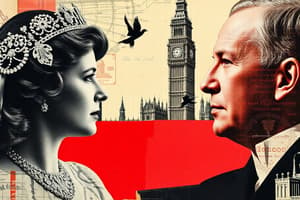Podcast
Questions and Answers
What role does someone like Queen Elizabeth II in Great Britain fulfill in a system without a separate head of state?
What role does someone like Queen Elizabeth II in Great Britain fulfill in a system without a separate head of state?
- Ceremonial role (correct)
- Legislative role
- Executive role
- Judicial role
What is the main emphasis of socialist systems in terms of ownership and distribution?
What is the main emphasis of socialist systems in terms of ownership and distribution?
- Collective ownership and redistribution of wealth (correct)
- State ownership and inequality
- Individual ownership and redistribution of wealth
- Private ownership and inequality
Which government system aims to create a classless society without private property or money?
Which government system aims to create a classless society without private property or money?
- Welfare states
- Socialism
- Communism (correct)
- Federalism
What is one of the key responsibilities typically handled by individual states in federal systems like the United States?
What is one of the key responsibilities typically handled by individual states in federal systems like the United States?
What role does federalism play in preventing the concentration of power in a government system?
What role does federalism play in preventing the concentration of power in a government system?
Why do countries choose different government systems?
Why do countries choose different government systems?
What is a defining characteristic of an absolute monarchy?
What is a defining characteristic of an absolute monarchy?
In a direct democracy, how are decisions made?
In a direct democracy, how are decisions made?
Which government system combines executive authority with electoral democracy?
Which government system combines executive authority with electoral democracy?
What distinguishes a constitutional monarchy from an absolute monarchy?
What distinguishes a constitutional monarchy from an absolute monarchy?
Which democratic system relies on elected representatives to make decisions?
Which democratic system relies on elected representatives to make decisions?
What is a key feature of a parliamentary system?
What is a key feature of a parliamentary system?
Flashcards are hidden until you start studying
Study Notes
Government Systems
In this modern era of globalization, it's important to understand the various ways governments operate around the world. Different countries have adopted different political systems to manage their societies effectively. Here we will explore some common types of government systems.
Monarchy
Monarchies are forms of government where power is held by one person — the monarch. This can be either hereditary or elected (as in some constitutional monarchies). In absolute monarchies, the ruler has unlimited powers over all aspects of society. However, most contemporary monarchies exist within a constitutional framework, meaning they hold limited powers and are subject to laws enacted by elected officials.
Democracy
A democracy is a form of government where citizens participate in decision-making through voting. There are several types of democratic systems such as direct democracies, representative democracies, and presidential systems. Direct democracies involve every citizen having equal say in decisions while representative democracies rely on elected representatives to make decisions on behalf of the people. Presidential systems combine both executive and legislative power into one leader, often referred to as a president.
Parliamentary System
Parliamentary systems combine elements from both monarchy and democracy. These systems grant significant executive authority to a prime minister who leads a parliamentary majority. Unlike a presidential system, there isn't a separate head of state. Instead, the ceremonial role is taken care of by someone like Queen Elizabeth II in Great Britain.
Socialism
Socialist systems emphasize collective ownership of the means of production, distribution, and exchange. They seek to achieve equality among people through the redistribution of economic wealth. Examples of socialist systems include communism and welfare states. Communism aims to create a classless society without private property or money, whereas welfare states provide public services and safeguards to protect against poverty and inequality.
Federalism
Federal systems divide power between two levels - national and local - each with its own set of responsibilities. For instance, the United States federal government handles matters such as defense, foreign policy, and currency regulation while individual states handle things like education and transportation. This division helps ensure that no single level of government becomes too powerful.
These are just a few examples of the many types of government systems in operation today. Each country has chosen a system based on its history, values, and needs. Understanding these diverse methods of governance allows us to appreciate how societies work together to build prosperous futures.
Studying That Suits You
Use AI to generate personalized quizzes and flashcards to suit your learning preferences.




